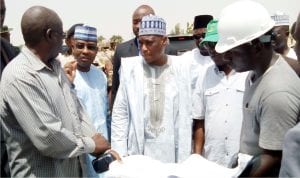Business
Expert Advocates Establishment Of Energy Bank, Tax Cut

Minister of Defence, Retired Brig.-Gen. Mansur Dan’Ali (middle), being shown the master plan of the construction of New Army Barrack in Gusau Zamfara State last Saturday
A renewable energy en
trepreneur, Mr Yusuf Suleiman, has advocated the establishment of a special bank for energy, to support renewable energy enterprise.
Suleiman made the call in an interview with newsmen in Abuja, yesterday.
He advised the government to look at the possibility of setting up a specific bank for energy or incorporating energy department into all existing commercial banks.
“The government should make available consumer financing; an average consumer is willing to spend N1, 000 every day for fuel but he don’t have N360, 000 to do a solar solution.
“If you can find somebody that can give him N360, 000 to do solar, he wouldn’t mind paying that 1,000 every day for the next one year.
“When he has paid off, he will continue to enjoy his solar solution.
“There is need for consumer financing to be supported by the government”, the expert said.
Suleiman said that the government should also support renewable energy business by allowing investors to access dollar at the CBN rate.
He said that such intervention would bring down the cost of solar deployment by 50 per cent.
According to him, those in renewable energy business source fund from parallel market to import materials.
In addition, he urged the government to reduce taxes on renewable energy products, including batteries which now attracts 20 per cent tax.
When batteries are charged at 20 per cent, if those duties are removed, that will further crash down the cost of our deployment by 20 per cent.
“Solar can really be made cheap but there is need for some government intervention to make it cheaper.”
Suleiman appealed to Nigerians to embrace renewable energy for domestic and industrial purposes.
According to him, solar solutions for industrial purposes are easier and cheaper than for domestic purposes.
“The big companies don’t need storage; they can programme their operations when the sun is out so they need minimal battery storage.”
Business
Two Federal Agencies Enter Pack On Expansion, Sustainable Electricity In Niger Delta

Business
Why The AI Boom May Extend The Reign Of Natural Gas

Business
Ogun To Join Oil-Producing States ……..As NNPCL Kicks Off Commercial Oil Production At Eba

-

 Sports5 days ago
Sports5 days ago2026 WC: Nigeria, DR Congo Awaits FIFA Verdict Today
-
Politics5 days ago
ADC, PDP, LP Missing As INEC Set For By- Elections In Rivers
-

 Environment5 days ago
Environment5 days agoOxfam, partners celebrate 5 years of climate governance programmes in Nigeria
-
Politics5 days ago
FG’s Economic Policies Not Working – APC Chieftain
-

 News4 days ago
News4 days agoVictory Over Insurgency Certain, Tinubu Assures
-

 Politics5 days ago
Politics5 days ago2027: Diri Unveils RHA LG Coordinators, APC Congress Panel
-

 Politics5 days ago
Politics5 days agoReps To Meet,’Morrow Over INEC’s 2027 Election Timetable
-

 Politics5 days ago
Politics5 days agoGroup Continues Push For Real Time Election Results Transmission

